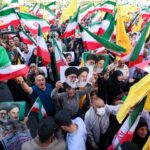
United States President Donald Trump has claimed responsibility for Israel’s initial attack on Iran, contradicting previous US assertions that the Israeli government acted unilaterally.
“Israel attacked first. That attack was very, very powerful. I was very much in charge of that,” Trump told reporters on Thursday.
- list 1 of 3Trump claims California election was rigged. Is he correct?
- list 2 of 3Nancy Pelosi, first female US House speaker, to retire from Congress
- list 3 of 3What has US Supreme Court said about Trump’s trade tariffs? Does it matter?
end of list
“When Israel attacked Iran first, that was a great day for Israel because that attack did more damage than the rest of them put together.”
His comments came as he called on Republicans to revoke the filibuster to pass laws in the Senate with a simple majority. He argued that his party should move on the Senate rule first in the same way that Israel launched the war against Iran.
Israel launched a devastating assault against Iran without direct provocation on June 13, killing several top generals and nuclear scientists as well as many civilians.
Iran responded with hundreds of missiles against Israel.
The US subsequently joined the Israeli war effort by bombing Iran’s three major nuclear facilities.
But in the early hours of the war, Washington stressed that Israel acted on its own and warned Tehran against retaliating against US troops and interests in the region.
“Tonight, Israel took unilateral action against Iran. We are not involved in strikes against Iran, and our top priority is protecting American forces in the region,” US Secretary of State Marco Rubio said at that time.
A ceasefire was reached after Iran launched a missile attack against a US air base in Qatar.
Advertisement
Since then, Trump has been increasingly taking credit for the outcome of the war, repeatedly claiming that the US “totally obliterated” the Iranian nuclear programme.
But on Thursday, the US president suggested he had initiated the war from the start.
For its part, Tehran has not provided a public assessment of the state of its nuclear sites, but Iranian officials have stressed that the country’s nuclear programme remains viable through the knowledge Iran has acquired over the years.
It is also unclear what happened to Iran’s stockpiles of highly enriched uranium.
Trump campaigned against starting new wars, promoting himself as a “peace” candidate.
During the war, he faced pressure from segments of his own base to keep the US out of the conflict.
In recent weeks, Trump has reiterated that he would like to reach a deal with Iran that would see Tehran forge formal ties with Israel.
In the early months of his second presidency, Trump opened negotiations with Iran over its nuclear programme, and repeatedly stressed that he wants an agreement with Tehran.
But with the nuclear file apparently dormant, analysts say there is no sense of urgency in Washington to restart talks with Tehran.
The Iranians have also expressed scepticism about Washington’s diplomatic overtures. US and Iranian officials were set to meet for a round of talks in June, days before the Israeli jets struck Tehran.
British Caribbean News

